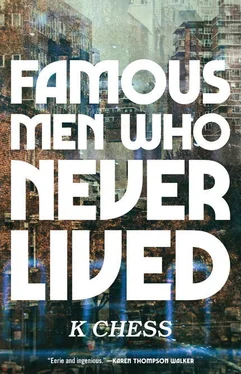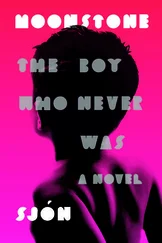The most sensible answer was a timer, one of those devices that could be set for a certain hour to give a home the impression of occupancy and deter thieves. Some common appliance in this world that glowed blue, something that he’d never heard of. That was all it was. Vikram felt his breathing slow a bit and he was glad that he hadn’t called the police, but he still felt himself on edge. For there was another answer, one he wasn’t allowing himself to think about. Keeping quiet, he retreated down the hall and descended the fire stairs back to ground level. He pulled the main door behind him, listened for the catch.
The parking lot looked just as it had before, as did the half-familiar but immutable skyline—low, workaday Queens with Manhattan ranged out behind, buildings he knew from his world and buildings he didn’t, the angry sky bruised purple from light pollution.
The old factory loomed behind him. The light that glowed the same color as the Gate he’d passed through was snuffed out. He hated to hope. And yet. What if there were more of them coming.
Or a door. A way to return.
In the guard shack, he settled back in the chair in front of the static monitors and pulled out the incident log. He licked the tip of his pencil. Checked the time.
Exactly 12:13 AM. He wrote 0:13 in the log, paused.
Back at home, where everyone used the twenty-four-hour clock, they’d called that bad luck time.
INTERVIEW TRANSCRIPT: IMAN IBRAHIM, AGE 59, QUEENS
I set up the lottery system, and I rigged it in my favor. I’m a statistician, after all, not a martyr, not like Dr. Mornay, a captain who insisted on going down with her ship. Mornay herself patted me on the back and sent me through the Gate with the first entry group in the fifteenth lot.
Just hours after the meltdowns, as she and her department began to haul all that dusty equipment out of secure storage, I was in my office at Gaynor Tech, programming an ordinator to pull from military and Alternative Service records and sort out those with Extreme Crime convictions. Mornay and I knew each other from years back, when I’d done the mathematical modeling for the Gate prototype. I’d been surprised to hear she’d held on to her job, much less her machine. But I was happy to help her.
Half the stations had gone black by midafternoon on the day of the attacks. The newsreaders on the stations that were left were wearing paper masks over their faces, as if that could do anything against radiation, talking about containment strategies for Richmond. Poughkeepsie was already a lost cause. I don’t remember what they were saying about the plant in Southern California at that point. Meanwhile, Mornay’s team trucked all the equipment down to Calvary Cemetery and set it up there without permission. That was the best open space they could think of, accessible to the most people via tramways and with three major traffic arteries right there. She had people pulling on all their connections—research colleagues, old contacts at government agencies, anything—trying to get permission to do what she was already doing. And then they sent through old Dr. Cristaudo, with a transmitter, as a test. A second test.
The first test came years earlier, during the development of the Gate prototype. I remembered the rig, of course, that meter-and-a-half-tall unit they’d set up in the safety-shielded first-floor Applied Physics lab at Gaynor, cinder-block walls shivering in its light. I used to go down there and watch. They’d throw items in attached to strings, and reel them back home. They’d take pictures. They’d send various instruments through and run my ordinated probabilities, again and again. But none of those physicists knew what, exactly, the hole connected to. And then one night, someone left the Gate powered up, and a graduate student of Mornay’s, a woman named Ree, stepped through.
At that point, their knowledge of what the device did was only theoretical. They had no idea the effect it would have on a living human being, or how much matter the aperture could accept at once. They’d tried a paper clip, an apple. Never a person. Now, they had proof it was possible for a living being to pass through—and a citation before the Human Subjects Board, to boot.
There was no way to call Ree back. She’d planned exactly what she was doing, though. Just before she ducked into the field, she looked up at the security camera and gave a little wave.
My escape was just as neat. By the time Homeland Defense set up their ad hoc Evacuation Commission, I was helping the army developers integrate the codes my lottery picks generated into an identity card scanning protocol. Once we were sure everything was working properly, I gave myself my promised reward. I fed my own code into the system.
The only person on this side who’s ever appreciated what I accomplished was the agent. He found me at the coffeehouse here, in Astoria, where I do my contract work from my laptop a few mornings a week. They sent a Somali American in a skinny tie and expensive-looking shoes to sweet-talk me, as if our parents’ distant shared ancestry could possibly make him feel like kin. In my own world, where the terrorists were America Unida and the Afghans drove out the Russian communists and the Jews never settled Cisjordan, I did not experience anti-Muslim prejudice. That only set me father apart from the midwestern-accented young agent, who must have suffered it all his life. A miscalculation. He was handsome. Maybe his handlers hoped I would find him sexually attractive. Or that I’d see him as a son. He sidled up to me, tried to buy me a bubble tea, and for a moment, I thought he must be from yet another government department. Another line of Debrief, a secret loyalty test. But no, it was much more sordid than that. He worked for a power delivery infrastructure company. His employers didn’t care about refugees; they were looking for ways to incorporate Gate technology, specifically its amorphous metal power transformers, into the smart electrical grid.
“I’m not an engineer,” I said. “I’m a statistician. What do you think I know?”
And his eyes went round in a gratifying way and he said, “More than we do.”
That would have been enough for some UDPs. The interest. We so resent being resented.
What do I remember, from Calvary? I stood between the graves and saw the Gate swallow up the one-hundredth and final entry group in Lot Fourteen. This was the first time I’d witnessed the full-sized model, the imposing physical architecture of the Gate itself, the hasty welding of its base, its rattling generators and galvanic compressors and the snaking cords that powered them all. Not to mention the cough-syrup-blue light it threw up. I saw the machine power down. Then, the soldiers began to let the next group of strangers file in through the checkpoint near the generators. I joined them at the staging area, looking up at the lingering spread of the plasma dispersal, as awed and frightened as anyone else.
Mornay was still there, supervising the emergency patch of some tube in the coolant system—even the prototype had always run incredibly hot—and I remember seeing a new looseness to the very skin of her face and wondering about how many hours she’d been up. Somewhere else, fires at the three power plants still raged, and workers risked their lives to operate the heavy machinery that would bury the smoking hulks, though the tons of earth could not muffle or contain the radiation. Somewhere else, army ministers met in various chambers and halls and bunkers, trading dares and threats, counting their weapons. And here I was, abandoning it all.
I didn’t want to distract her, but I felt the need to say something, to say I was sorry. I must have said something like that. Her response, I recall perfectly: “You did your part, Dr. Ibrahim.” Then, she put her hand on my shoulder blade. “From each, according to her ability.”
Читать дальше












